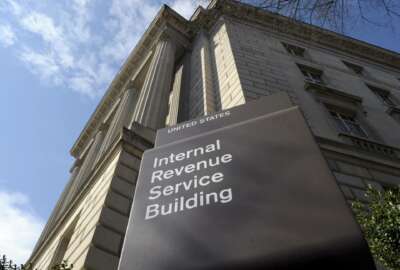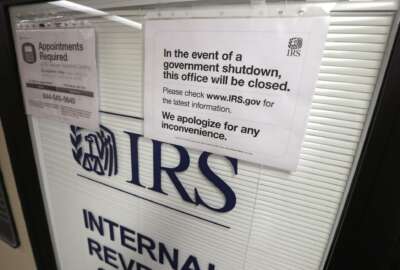IRS could raise $200B in revenue, double its workforce under Biden spending plan
The IRS plans to surge its hiring to fill its depleted ranks. The agency told Congress last year it has 33,000 fewer employees than it did a decade ago.
The IRS would bring in significantly more revenue if Congress went along with the Biden administration’s plan to ramp up the agency’s budget over the next decade, according to a watchdog report.
The Congressional Budget Office, in a report released Thursday, said the administration’s plan to increase IRS funding by $80 billion over the next decade would increase revenue by about $200 billion over the same period of time.
Most of the funding — about $60 billion — would go toward IRS enforcement activities.
By 2031, the IRS under this plan would more than double its workforce and have a 90% larger budget, compared to current spending levels.
The IRS plans to surge its hiring to fill its depleted ranks. The agency told Congress last year it has 33,000 fewer employees than it did a decade ago.
IRS Commissioner Chuck Rettig told lawmakers he expects to hire mid- and senior-level employees from the private sector who can “hit the ground running” and wouldn’t need much training to get up to speed.
Rettig, however, warns that a lengthy hiring and onboarding process makes it harder for the IRS to recruit in-demand talent, and is calling on Congress to expand the agency’s direct hiring authority.
CBO Director Phillip Swagel, in the agency’s analysis, warns that if the IRS can’t hire its preferred mix of experienced candidates, it would have to commit more resources to train less experienced hires.
“If it hired less experienced candidates, it would have to spend more resources training them. Not only would they take longer to become productive, but current staff members would have to devote more time to training them,” Swagel wrote.
National Taxpayer Advocate Erin Collins, in her annual report to Congress, said the IRS failed to hire more than 5,000 full-time employees it planned to bring onboard between fiscal 2017 and 2019, despite allocating funding for this workforce increase.
Nearly 5,600 employees leave the IRS each year, and as far as employees who will be retirement-eligible, Collins estimates as much as 32% of the IRS workforce could leave the agency next year.
CBO estimates new hires at the IRS would start collective revenue from audits about 30 months after joining the agency, noting that a moderately complex audit takes the IRS about 24 months to resolve, considering for appeals and litigation.
The watchdog office also warns that if the IRS sees a higher level of attrition, personnel would have fewer years of full productivity.
Audits on the rise
CBO based its estimates on the IRS’s projected returns on investment for spending on new enforcement initiatives. The agency provided those ROI projections for the past five years as part of its budget justifications.
In recent years, CBO found the IRS at its peak has collected $5-to-$9 for every dollar in its budget.
CBO expects IRS to prioritize enforcement activities that will have the highest return on average, but it also expects that tax cheats will find new ways to evade enforcement as well.
“CBO expects taxpayers to adapt to the IRS’s enforcement activities and adopt new ways of evading detection, so an enforcement activity may have a lower return in later years,” Swagel wrote.
Spending would increase year-over-year over the decade, but the highest rate of growth would happen in the first few years. CBO finds the agency’s return on investment would “ramp up over three years as staff become trained and fully productive,” and would eventually level off.
CBO expects increased enforcement activities would “only modestly” increase the rate at which taxpayers voluntarily comply with paying taxes owed.
The increased IRS spending would lead to an across-the-board increase in audit rates for all income levels, but higher-income taxpayers see the biggest increase in audits. For context, CBO notes that this increase would bring the audit rate back to where it was 10 years ago.
President Joe Biden proposed $80 billion in IRS spending as part of his infrastructure spending package. The Senate at one point considered including $40 billion for the IRS in the $1 trillion bipartisan spending package, but negotiators removed that provision from the package.
Democrats may consider adding IRS funding to the $3.5 trillion budget reconciliation package that would have a much narrower path to becoming law. All Democratic senators would have to support the measure, and Vice President Kamala Harris would have to break a tied vote in the Senate.
However, Sen. Joe Manchin (D-W.V.), in a Wall Street Journal op-ed posted Thursday, urged his colleagues to “hit a strategic pause” on the budget reconciliation package.
CBO projected in July 2020 that a $40 billion increase in enforcement funding would help the agency collect $103 billion in additional revenue.
The IRS’s return on investment also depends on factors like IT modernization that CBO doesn’t quantify in its projections. Modernized systems with fully digital records on taxpayers, it found, could increase the efficiency of tax examiners.
The administration is also proposing financial institutions increase their data reporting to the IRS. CBO found this data sharing could allow the IRS to take a more targeted approach to audits, and reduce the number of “no change” audits, in which the IRS determines a taxpayer isn’t delinquent on taxes owed.
Part of the IRS funding increase would go toward supporting new information reporting systems to support this data-sharing, but those savings would be estimated by the staff of the congressional Joint Committee on Taxation.
“Expanded information reporting might allow the IRS to better target potentially noncompliant taxpayers; it might also prompt taxpayers to file more accurate tax returns,” Swagel wrote.
Copyright © 2024 Federal News Network. All rights reserved. This website is not intended for users located within the European Economic Area.
Jory Heckman is a reporter at Federal News Network covering U.S. Postal Service, IRS, big data and technology issues.
Follow @jheckmanWFED






